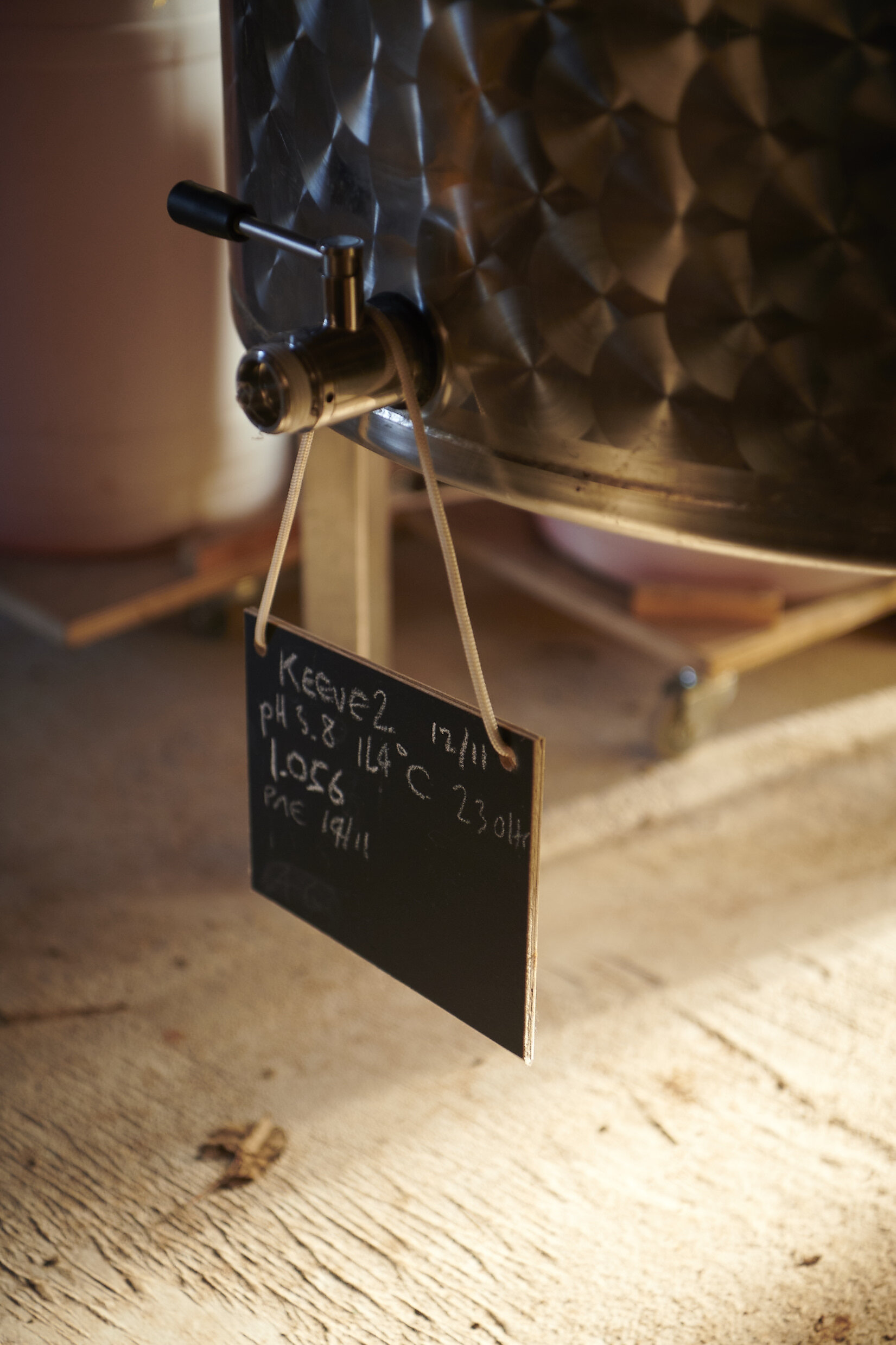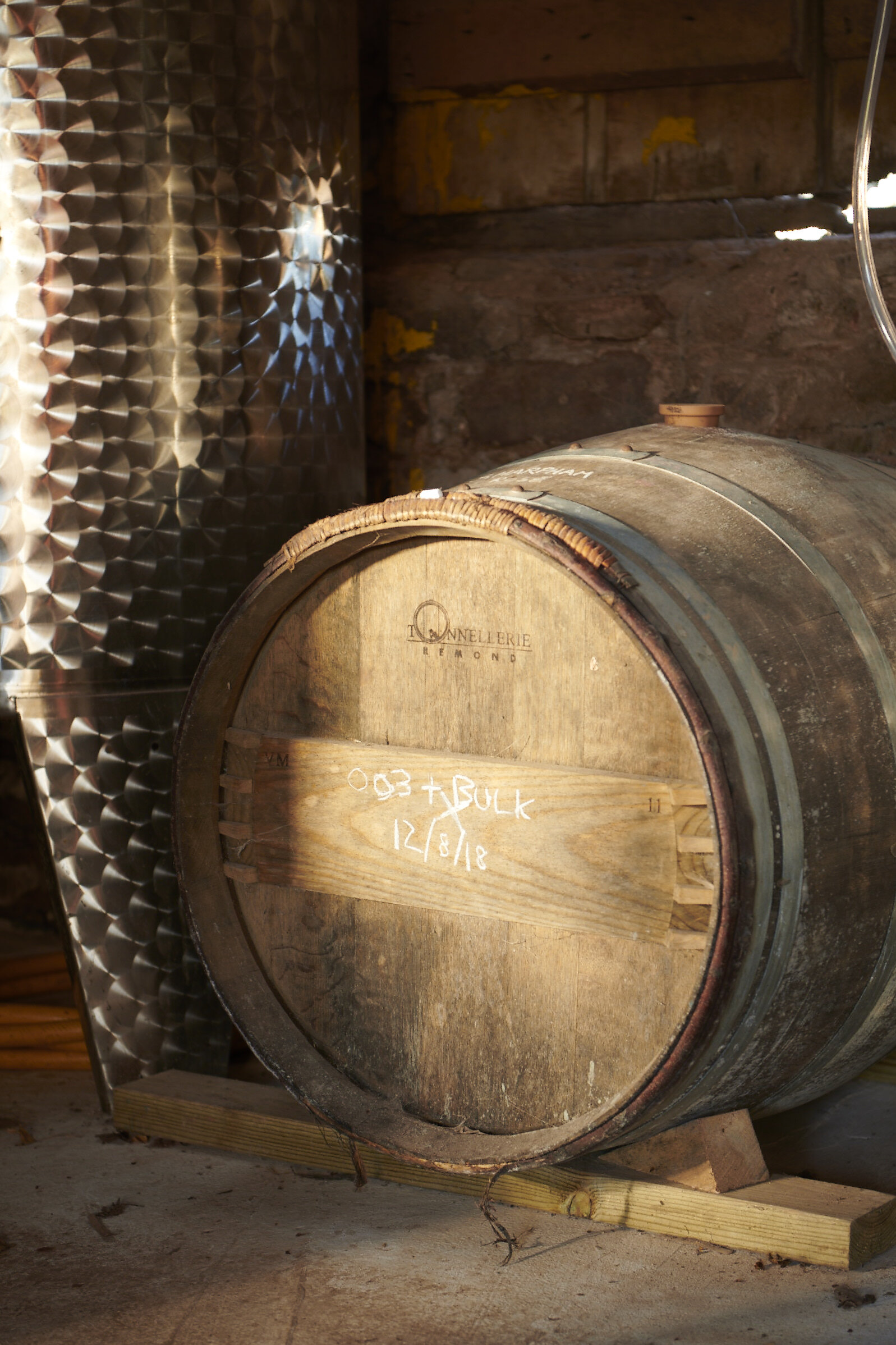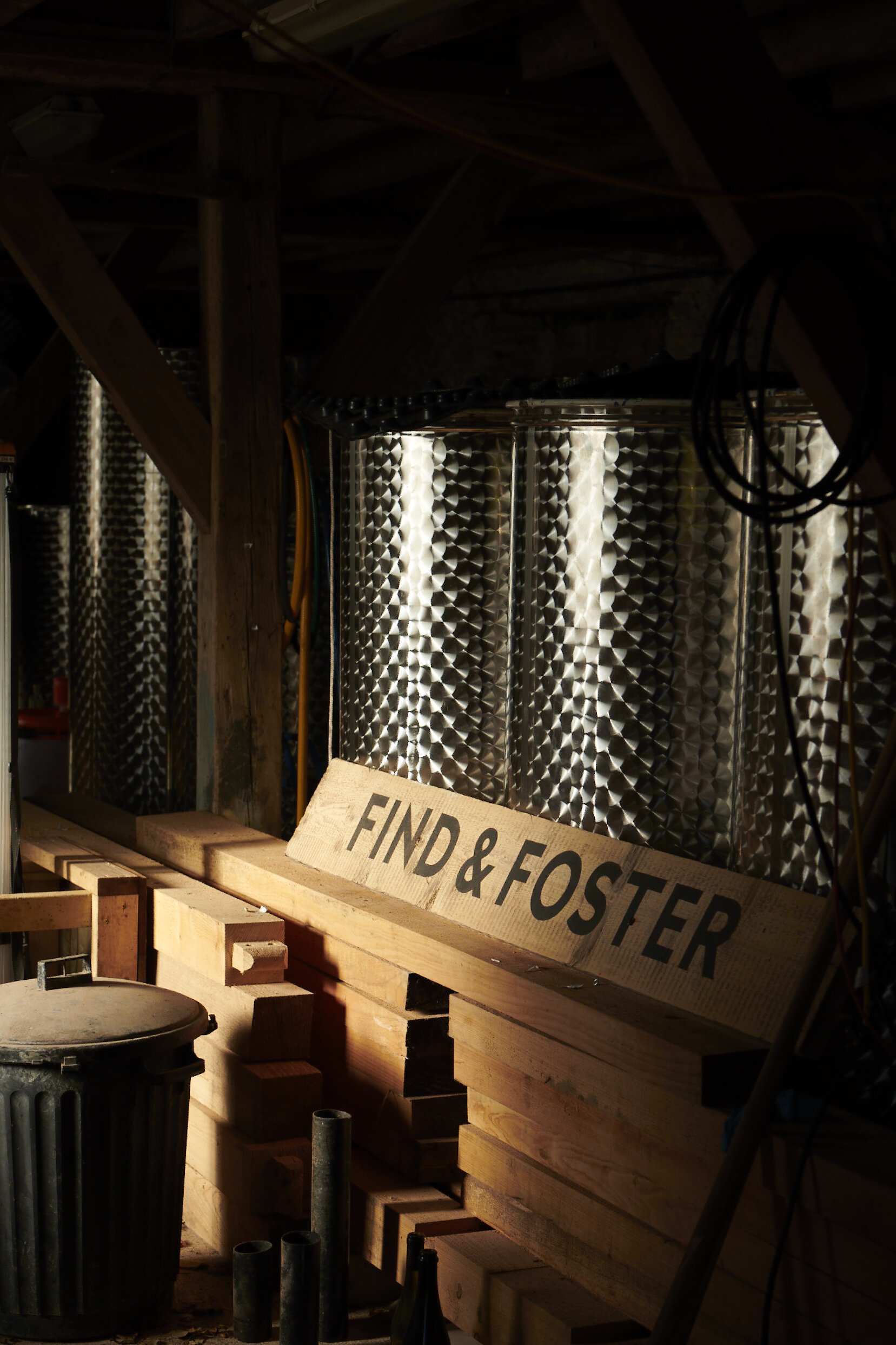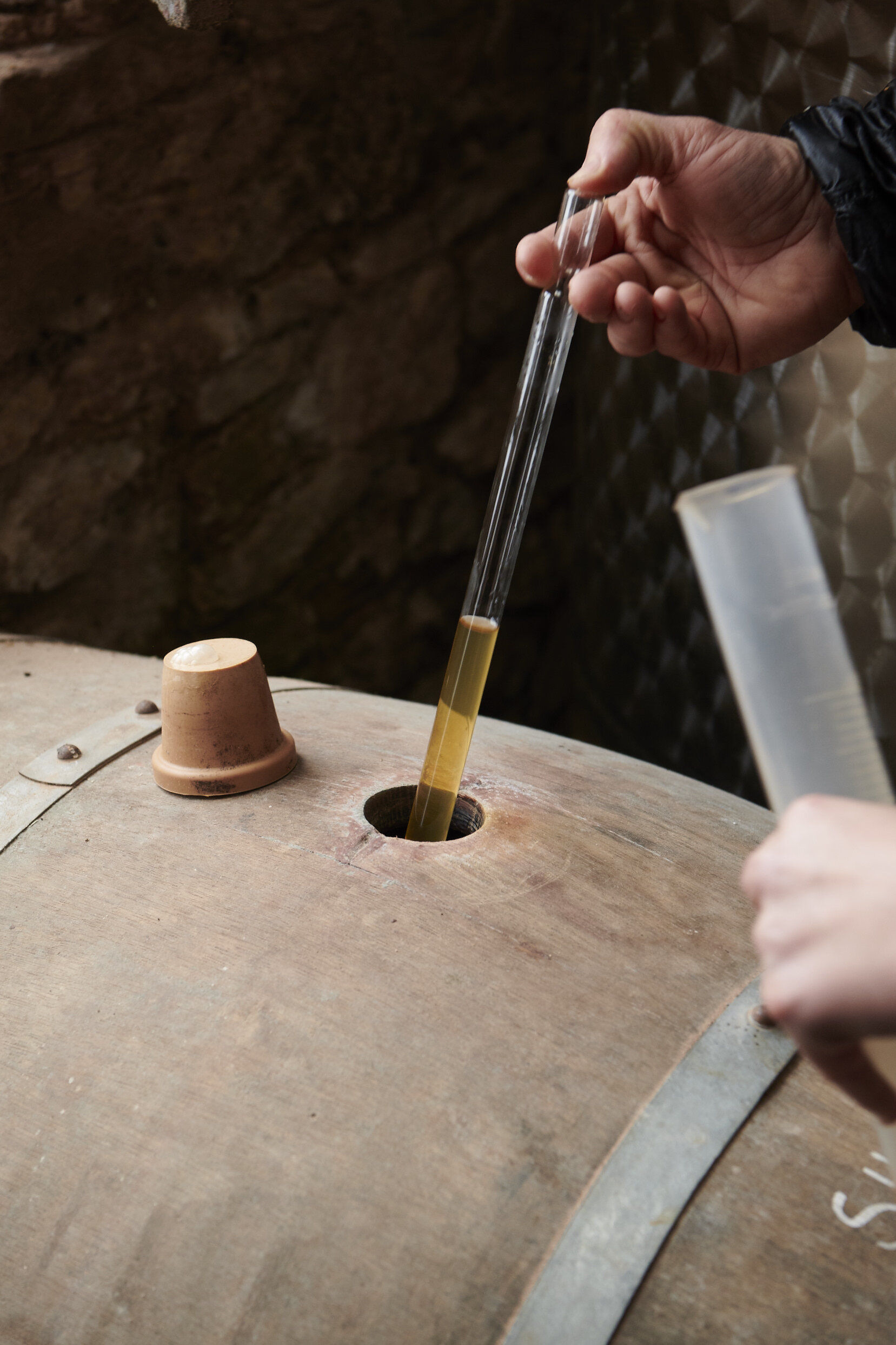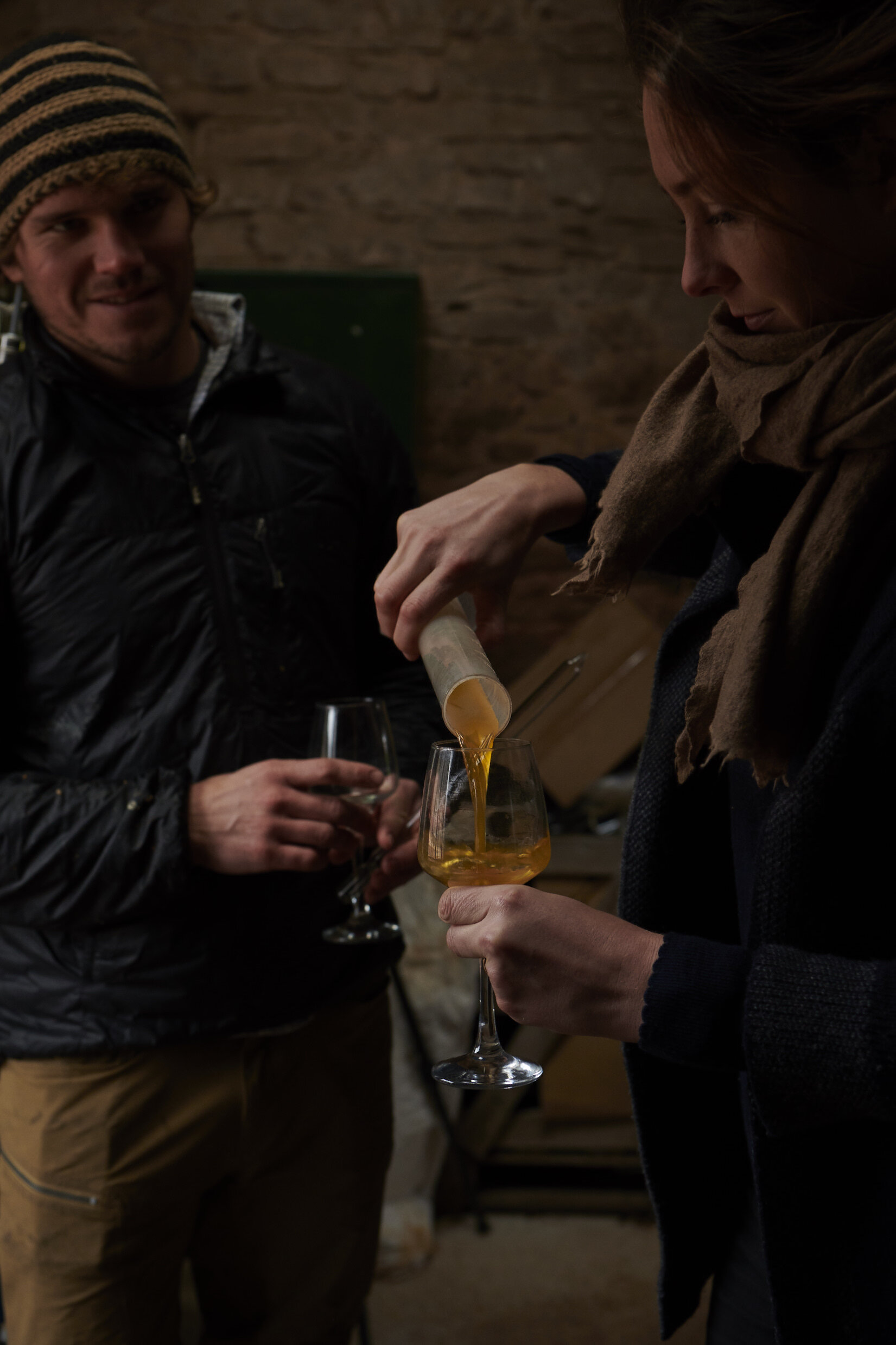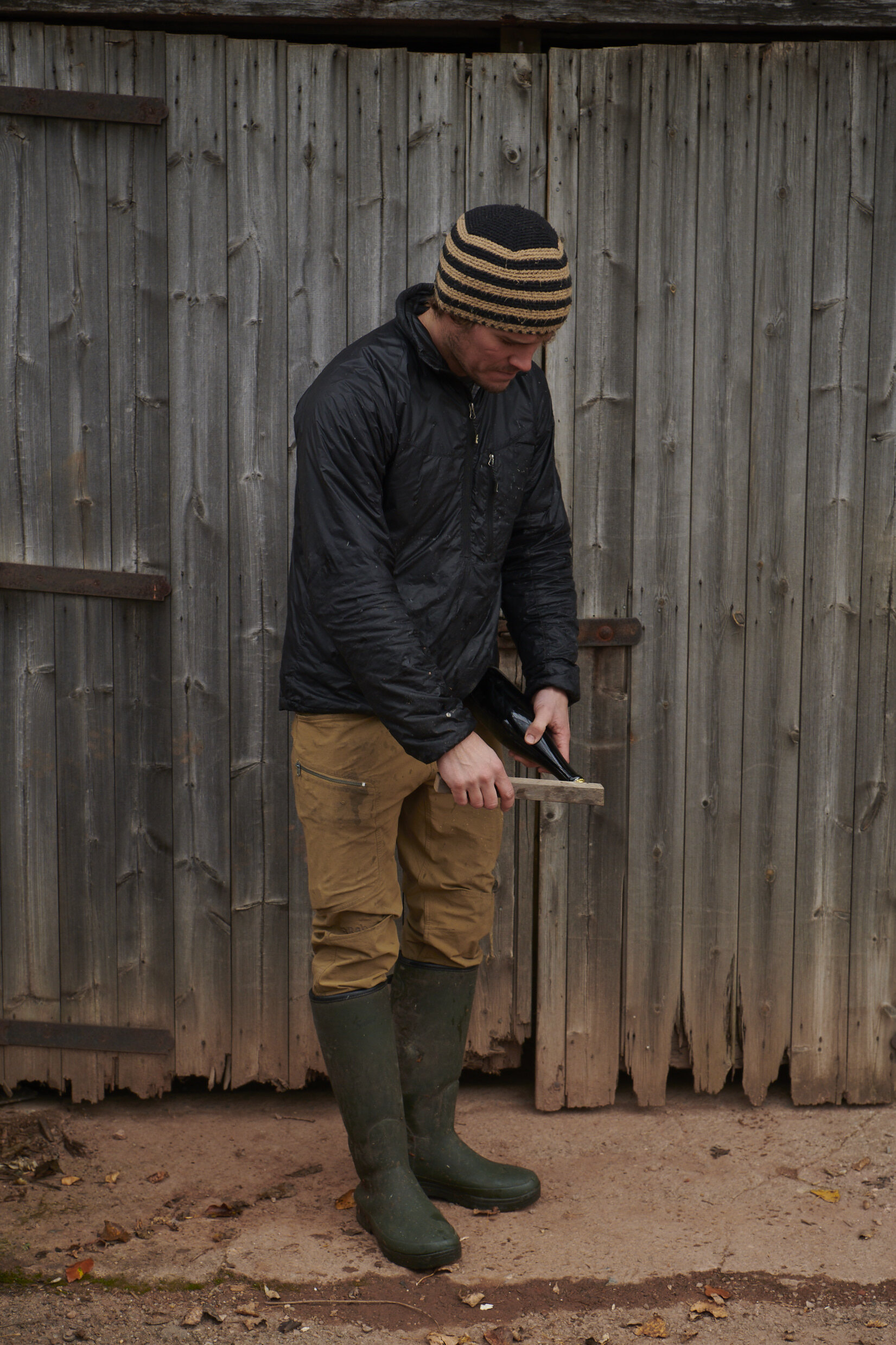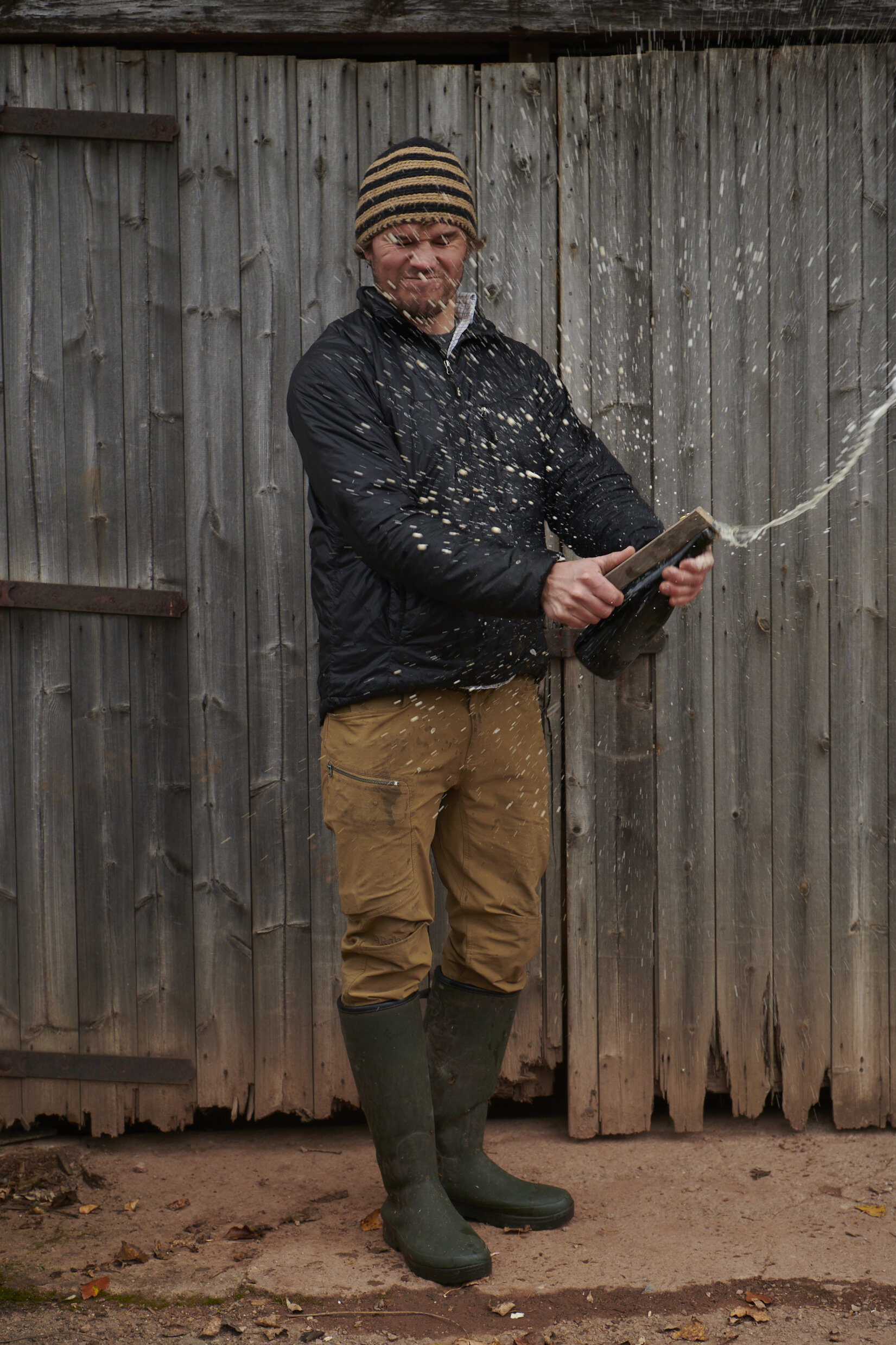Every Inch of Space in my Heart — Devon’s Find & Foster Cider
Long before Polly Hilton even picks an apple, the next generation Devon cidermaker says, “the first bit of blending happens in my head, then in the orchard, then at pressing time.”
Polly’s enthusiasm for cidermaking—and her business, Find & Foster—is infectious. “I regularly think about how much I love every part of it. To have so much variation in one job is amazing,” she says. “Which bit my favourite is will vary because when I’m anticipating harvest, the thought of it coming is really exciting. But then, by the time it finishes, I’m completely knackered and I never want to see another apple, especially not in the rain!”
Photography by Olivia Estebanez
Spool back to late 2015, and Polly decided she’d had enough of sitting in an office. She needed a fresh challenge. Growing up in Devon, she gained a foundation in science with A-levels in chemistry, physics and biology; taken a module with Master of Wine Susan McCraith while doing a degree in Equine Business; studied Sustainable Agriculture at postgraduate level, then completed an EU-funded ‘slow food’ study tour in Tuscany.
She’d never really been into cider though. Even when she started researching neglected orchards—Devon has lost some 90% of its traditional orchards—she wasn’t sure how to make them economically viable. Then she tried Pilton’s keeved cider, and “that made me realise that you could make something amazing.”
Polly then got hold of the map of the Exe Valley in mid-Devon from the People's Trust for Endangered Species, to track down more orchards. She started talking to the owners—usually farmers—who were often grateful to hear her idea of managing their orchards in return for fruit that was going to waste.
Did they think she was mad? “Probably,” she laughs, “and I think some still do. Orchards are a pain in the arse for a lot of farmers, especially as where you get huge loads of apples falling, either your animals get sick because they end up eating too many, or you get loads of nettles growing because of the high amount of nitrogen that goes back into the soil.”
Meanwhile, her husband Mat spotted that one orchard owner also had lots of derelict barns, so they asked to rent one situated not far from their home in Rewe, in which to produce cider. Their mid-Devon orchard collection soon spread, with one each in the villages of Rewe, Cadbury, and Huxham, two in Brampford Speke, plus about seven separate bits of orchard on another, “ginormous” farm.
“Polly inspires people, so everyone wants to help her,” West Country cider historian James Crowden tells me. “She’s been fantastic; she’s taken on board what people are saying. She understands the science and the chemistry, the nuts and bolts of fermentation and yeast, that’s essential. She hit on a brilliant bit of Devon; the climate, terroir, soils, the apples in that area. And what’s amazing is that she’s only been doing it for five years.”
***
Having sorted the finding part, Polly now needed to foster these orchards—and a viable cidermaking business—by tapping into the knowledge and experience of existing cidermakers including Pilton’s Martin Buckley, Susanna and James Forbes of Little Pomona, and Tom Oliver of Oliver’s Cider and Perry.
Susanna first met Polly in 2017 when they were invited by Tom to help with his 2015 vintage blend. They tasted their way through 17 samples from the best barrels, before she later spent some time with Polly back in Devon.
According to Susanna, it’s not only Polly’s time with winemakers, but also her inquisitive mind and palate that have set her in good stead, as she and Mat gradually build a sustainable cidery. “When you start making something that’s really good, people want you to hurry—but she won’t be hurried, not until the liquid’s just right. There’s a real precision in their ciders. It’s very exciting,” she says.
““Whenever we open anything from Polly, it’s a treat.””
“There’s a real affinity, because she introduces you to the place as if it’s her friend,” Susanna continues. “You begin to understand her bond with the different trees. Even if some varieties you won’t know, she will have tasted them all, and must have a really good taste map memory of what each apple tastes like, and this vivid memory of what will be going into the blend.”
Tom Oliver’s advice to Polly was simple: “Don’t make cider that everyone’s going to like—just make it for the person who’s going to like it.” So she weaponised her open mind, and says that not going into cider with a preconceived idea of what it should taste like has been very useful.
***
Polly and Mat launched Find & Foster in 2016, immediately winning plaudits from their peers. Fast forward a couple of years, and Polly was applying for funding to grow the business. “I’d designed this whole job for myself; I love being outside and had more energy than you could ever use. I wanted to be climbing trees, picking apples and pruning and being active all the time.”
Then without warning, in 2017 Polly suffered from a stroke, something she describes as “a completely random, weird setback that ruined everything. I thought, shit, what am I going to do now? I made my whole life around having loads of energy, and then a walnut-sized part of my brain died. I was in intensive care for 11 days, then had a long, slow recovery at home, when physios, a speech therapist and an occupational therapist came to my home every day for weeks.”
The therapists took Polly from being unable to walk or talk properly to getting back on her bike and work in the cidery and orchards again. It was an extraordinarily quick recovery, but she’ll never be 100%. “The recovery process was about teaching the other parts of my brain to do the work the dead bit used to do, as well as their existing functions, which is why my brain gets exhausted and overwhelmed very easily now.” Luckily, the stroke didn’t affect any of Polly’s senses—crucially taste and smell—and she only stepped back for a few months.
Polly says the temptation not to continue was vast, but Mat was her rock. “He took the reins when he needed to, and made sure everything carried on, and that I never gave up when I really wanted to.”
“Mat is very practical,” says Polly, “and his palate and ability to smell out a fault—like cork taint—in the cider is incredible. We smell things so differently. So it’s a really good balance.”
Another fillip for Find & Foster was being ordered for major organisations like the Tate galleries, and zero-waste, fine-dining East London restaurant, Silo. “Knowing there’s a sommelier who has chosen your cider along with the wines they’ve carefully chosen,” Polly says. “To treat it with the same care that they treat their wine, and pair it with the right dish to bring the best out of it—and use it to bring the best out of food. Knowing it’s stocked at places with sommeliers has been a big moment of thinking, ‘wow, that’s cool.’”
““I want to keep trying to make more interesting cider. I don’t want to make more—just to keep making it better.””
Silo’s former head sommelier, Ania Smelskaya, already had an obsession for cider, and was hunting down the best UK cidermakers, also including Pilton’s Tamoshanta and Tillingham’s Starvecrow pét-nat. “Find & Foster made perfect sense from my point of view and Silo’s—local producers and sustainable—encouraging and embracing the tradition. I’ve tried lots of ciders in different parts of the UK and it’s hard to maintain that finesse when you make a natural cider.”
Ania visited Polly and Mat in Devon, working with them for the day, pressing apples and blending a few things, which furthered her own understanding of cidermaking.
“I don’t know how many apple varieties are [used by] Find & Foster, but it felt like at least fifty—everything from acidity to tannins to sweetness to bitterness,” she says. “It’s such a complex product, closer to grapes. You can age it in different barrels, you can keep the skins on, you can blend it in different variations, and it does deliver this natural wine feel.”
***
The genius and alchemy of provenance, precision, planning—and Polly’s palate and instinct—come into their own when tasting Find & Foster’s ciders. She took inspiration from the Pilton keeved cider that first turned her head, and found these orchards had the perfect fruit: “late-ripening, old cider varieties, big old trees from orchards that hadn’t been fertilised—so they were low nutrient orchards, which you need. And all these things work really well for keeving.”
They also had lots of earlier ripening apple varieties that wouldn’t lend themselves to keeving, and Polly wanted to get the best out of every type of apple—not always cider apples, some cooking or juicing or eating apples—and all with different ripening times. So she turned to the famed French winemaking technique, méthode champenoise. “We drink champagne, cava or prosecco, and those bubbles bring out that fresh acidity. And these apples have the low tannin and acidity that works with particular cider apples—the same qualities that you get in the grapes that make those sparkling wines.”
After getting the hang of keeving and the champagne method, they finally employed another winemaking technique, pétillant naturel (also known as pét-nat—where light fizz is achieved through refermentation in bottle). Mostly because of taking on new orchards with apples that wouldn’t fit the other methods. “We’ve got a lot of really aromatic apples, but they’re not right for the champagne method because they’re full of flavour,” Polly says. “And they ripen too early for keeving; you’ve got to wait right ‘til the end of winter to start keeving, because you need the low temperatures. Pét-nat came from wanting to get the aromas out of the skins, bottle early and keep the fruitiness of apples.”
This means their cidermaking is virtually non-stop, as all these techniques overlap, because of the diversity of varieties. The ripening time varies—the earliest in August, the latest about February. “Over that time you’re constantly visiting different orchards trying to find the apples that are perfectly ripe. We literally pick tree by tree. And what kind of cider that apple becomes can also depend on what point in the season it is—so we only make keeved cider in the depths of winter to utilise the cold temperatures,” Polly adds.
According to Susanna Forbes, this attention to detail is crucial to Find & Foster’s success. “If you’ve got a bunch of fruit which has been harvested when the median is ripe—as opposed to when everything is ripe—you’re not going to get the same complexity; same as in wine. The real complexity of aromatics comes in a little phase right after ripeness. And I know from what I’ve tasted, I get the same enjoyment of layers of complexity. Whenever we open anything from Polly, it’s a treat.”
Anyone who has tasted Find & Foster’s keeved, Huxham cider is bound to agree. I like it with a West Country goat cheese like Quicke’s from Devon or Rachel from White Lake in Somerset, or with pan-fried scallops with pancetta and leeks. Susanna says she’d also pair it with a fish dish, or something with spice and coconut milk—Thai or Malaysian—to complement the weight and intensity of the flavours. For sommelier Ania Smelskaya, the Huxham can be a background to your food without taking over—or disappearing—with a lingering effect that you usually get from wine. And like me, she’s a big fan of their Snicket and Pendragon, especially for brunch.
The plaudits keep coming, but Polly isn’t resting on her laurels. After all, she’s overcome a stroke that knocked out part of her brain—literally picking herself up and starting all over again, when others might have given up. She’s far too busy blending in her head, then when picking the apples, and between all the different tanks.
“I want to keep trying to make more interesting cider. I don’t want to make more—just to keep making it better.”
***
The gorgeous photos used in this piece were taken by Olivia Estebanez and provided by Felix Nash, author of Fine Cider, for which these images were originally taken. If you’ve enjoyed this feature, please consider picking up a copy of his excellent book from your local, independent bookseller, or direct from Felix via his wholesale cider business (also called Fine Cider) right here.










